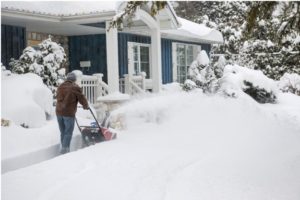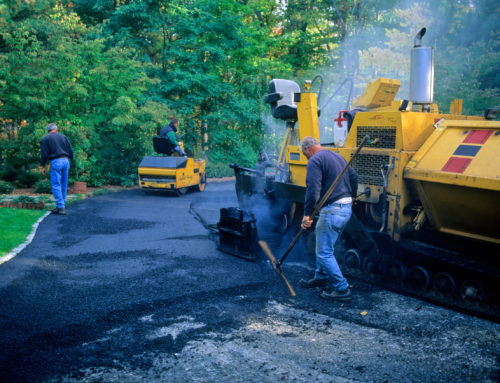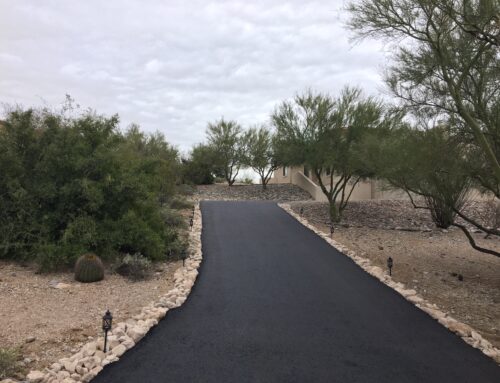When it comes to paving your driveway, you have options. We’ve talked about concrete and asphalt driveways before on the blog, and today we are going to answer common questions about another surface option—chip seal driveways.
Asphalt, concrete, and gravel are more common options, but chip seal driveways are just as valid. In some situations, it may actually be the best choice! However, many people aren’t familiar with this material. To make the most informed decision for paving your driveway, it will help to have some basic knowledge about chip seal. To that end, here are the answers to five common questions about chip seal driveways.
- What is Chip Seal?
To create chip seal, a thin asphalt foundation is poured and then crushed stone is compacted over it. Then, a couple more layers of crushed stone are compacted on top of that. The end result is a stable and eye-catching driveway. Asphalt is a great option and looks clean, but chip seal driveways add a textured and colorful look. The crushed stone is also customizable to fit your particular environment. Live in the desert? Match the landscape with tan or brown. Cabin in the forest? Lay down some grey stone and contrast the green conifers. Also, driving on chip seal is just as smooth as any other option—it’s not at all like driving on a bumpy, loose-rock gravel road.
- How long will Chip Seal Last?
If you’re looking for maximum longevity, you should probably lay down asphalt or concrete. While the texture looks great, the crushed stone does wear down more easily. Asphalt lasts 10-15 years, and a chip seal driveway will give you 5-7 years. However, don’t think of it as fashion vs. function. Shorter longevity doesn’t mean it isn’t as good to drive on. Also, it is much easier to resurface than asphalt and concrete. Although it doesn’t last as long, it’s less of a headache to replace and maintain.
- How is Chip Seal Maintained?
There really isn’t any consistent maintenance that needs to be done on chip seal driveways. Asphalt and concrete start to crack and need to be sealed regularly. Chip seal, on the other hand, doesn’t need to be sealed. However, it can be damaged if anything heavy is dragged over it. For example, snow plows are a common culprit. As long as you’re mindful while your shoveling or plowing, it isn’t too difficult to avoid scraping.
- How Much Does Chip Seal Cost?
Chip seal driveways are a cheaper alternative to asphalt. It’s a little more expensive than gravel, but gravel isn’t nearly as smooth or pleasant to look at. Typically, you’re looking at about $5-7 per square foot. Of course, this varies on conditions and surfaces. For all our penny pinchers and landscape misers out there, chip seal is definitely a good option. You may be thinking, If cheap seal lasts half as long as asphalt, won’t it be way more expensive? There is a chance this might be true in the long-term, but chip seal is less expensive to maintain and replace, too. It isn’t a bad idea to talk to your contractor about the price of resurfacing down the road.
- What are the Advantages and Disadvantages of Chip Seal?
We’ve covered a lot of information on the blog today, so we’ll wrap up by reiterating the advantages and disadvantages of chip seal driveways. Afterwards, you’ll know everything you need to know to pick the best material.
Advantages
- Unique, customizable, and eye-catching color and texture
- Doesn’t require regular maintenance or sealing like asphalt and concrete.
- Cheap and easy to install—an estimate of about $5-7 per square foot.
- Just as stable and smooth to drive on as asphalt or concrete.
Disadvantages
- Longevity: Needs to be resurfaced every 5-7 years.
- Can be damaged more easily by certain vehicles.
- Harder to find contractors who install chip seal driveways.
Still on the fence about chip seal? Now that you know all about chip seal, you’ll start to see it around town in driveways and parking lots. Words on a page are great for getting information, but sometimes you just need to see for yourself. Check them out, see how they look, feel how they are to drive on. You may find this is just what you needed to make your decision.
If you didn’t know about chip seal before, you certainly know about it now. We’ve heard all of these common questions before, and we’ll hear them again. The real question, though, is if chip seal is right for you. Luckily, we at Sunrise Asphalt have been installing chip seal driveways for years. Contact us today and we’ll provide the best service in the Tucson area.
Note: Any prices are estimates only, Sunrise Asphalt works with each homeowner to estimate and price the individual job correctly.




